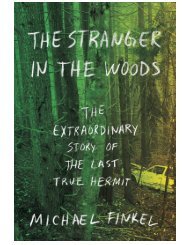Create successful ePaper yourself
Turn your PDF publications into a flip-book with our unique Google optimized e-Paper software.
Unlike the rest of Scotland, where most of our DNA samples came from blood-transfusion<br />
donor sessions, there are none of these in Orkney or Shetland so we had to arrange other methods<br />
of getting our samples. Jayne Nicholson discovered that the Shetland Science Festival was being<br />
held in May, so she arranged for us to have a stand at the Festival and also organized a series of<br />
visits to schools for the same week. This worked extremely well: while two people manned the<br />
booth at the Festival, the others went to schools around the islands. The Festival itself was held in<br />
a smart new sports hall on the outskirts of Lerwick, one of many around the islands. The same is<br />
true of schools, all of which have brand-new buildings. Shetland Council spends a lot of the<br />
revenue it gets from the Sullom Voe oil terminal on upgrading the island infrastructure. The roads<br />
are excellent, the inter-island ferries are well equipped and run on schedule. I saw neither poverty<br />
nor extravagant wealth on Shetland.<br />
The Science Festival was a jolly affair. Groups from all over Scotland, including a strong<br />
contingent from the University of Aberdeen, put on displays of such varied nature as an artificial<br />
tornado generator, a giant bubble machine and a practical course in making plaster casts of fossils.<br />
Although the Festival was aimed primarily at schoolchildren, there was a healthy flow of adults<br />
coming to our stand and we had no difficulty enrolling volunteers in the Genetic Atlas Project. We<br />
were not taking blood, only cheek swabs, and I am sure that helped. For this we use a small brush<br />
like a miniature bottle-brush, 1 inch long at the end of a 5-inch plastic handle. The bristles on the<br />
brush collect cells from the inner cheek as they are rubbed gently over the surface. There is plenty<br />
of DNA in these cells and the brushes can be stored for weeks, or posted, without the DNA<br />
suffering. It is one of those seemingly unimportant practical changes that actually make all the<br />
difference. Now, instead of collecting blood samples, we can send brushes to anywhere in the<br />
world and receive DNA back through the post. These brushes can hold DNA safely under even the<br />
most extreme conditions. I have equipped a number of university expeditions with DNA brushes<br />
and nearly all of them are returned with the DNA intact, even when they have been carried for<br />
weeks in a rucksack through deserts and across mountains.<br />
When we began to use the brushes to collect DNA, we would often help the volunteers by<br />
doing it for them. However, we have now had to stop this, and volunteers must do it themselves.<br />
This is not for fear of breaking new Health and Safety regulations but for a far more delicate<br />
reason. False teeth. It was at the Shetland Science Festival that I learned this painful lesson. An<br />
elderly lady, eager to join in the project, opened her mouth to allow me to rub the inside of her<br />
cheek with the brush. No sooner had I begun to guide the brush across her cheek than it suddenly<br />
stopped moving. I let go. I looked at her. She blushed and turned away. After regaining her<br />
composure, she returned with the brush and the explanation. I had inadvertently dislodged the top<br />
set of her dentures, which had dropped down and clamped the handle of the brush to the lower set.<br />
After this, we let people do their own brushing.<br />
The Science Festival was also the scene of another humiliation. One of my obligations in<br />
exchange for the display space was to give a public lecture during the Festival, to which I was<br />
happy to agree. As usual I spent the previous evening preparing my talk and organizing my slides.<br />
With five minutes to go before my talk, I went over to the screened-off section of the hall that had<br />
been set aside for public lectures. There was no one there. I checked the time on the Festival<br />
programme. This was definitely the right time, and the right place. I waited, but still nobody came,<br />
so I thought there must have been some sort of rescheduling that I had not got to hear about. As I
















